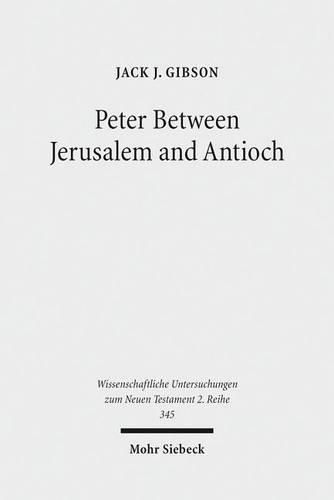Readings Newsletter
Become a Readings Member to make your shopping experience even easier.
Sign in or sign up for free!
You’re not far away from qualifying for FREE standard shipping within Australia
You’ve qualified for FREE standard shipping within Australia
The cart is loading…






Why did Peter cease eating with the Gentile Christians at Antioch (Gal 2:11-14) after defending his decision to eat with Cornelius before the entire Jerusalem church (Acts 11:1-18)? Beginning with a character study of Peter throughout the Gospels and Acts, Jack Gibson demonstrates that Peter is consistently portrayed as being a faithful disciple whose pre-Pentecost impetuosity is due to a lack of understanding of the message of Jesus and his post-Pentecost boldness is due to his newly-revealed understanding of this message. The historical background to the Antioch incident is considered, with special consideration given to the Jewish response to Roman rule, a response which was characterized by passive resistance through the period of the Roman prefects and Herod Agrippa (AD 6-44) and an increasing acceptance of active resistance by the general populace after Agrippa’s death. Peter’s relationship with James and Paul is analyzed, culminating in an evaluation of Peter’s motivations for ceasing to eat with the Gentiles.
$9.00 standard shipping within Australia
FREE standard shipping within Australia for orders over $100.00
Express & International shipping calculated at checkout
Why did Peter cease eating with the Gentile Christians at Antioch (Gal 2:11-14) after defending his decision to eat with Cornelius before the entire Jerusalem church (Acts 11:1-18)? Beginning with a character study of Peter throughout the Gospels and Acts, Jack Gibson demonstrates that Peter is consistently portrayed as being a faithful disciple whose pre-Pentecost impetuosity is due to a lack of understanding of the message of Jesus and his post-Pentecost boldness is due to his newly-revealed understanding of this message. The historical background to the Antioch incident is considered, with special consideration given to the Jewish response to Roman rule, a response which was characterized by passive resistance through the period of the Roman prefects and Herod Agrippa (AD 6-44) and an increasing acceptance of active resistance by the general populace after Agrippa’s death. Peter’s relationship with James and Paul is analyzed, culminating in an evaluation of Peter’s motivations for ceasing to eat with the Gentiles.